Over 632.4K Daily Active Readers:
Pageant Dictionary: Beginners Guide Share on Social Media
Pageantry is an industry with its own language. If you're new to the glitz and glamour of pageantry, you're likely unfamilar with all of the terminology you'll need to know. Let us at Pageant Planet be your pageant concierge and connect you to all the knowledge and resources you need to end the day with a crown on your head. Find a coach, select your pageant, learn everything you need to know about pageant interview or find your next pair of pageant shoes with us.
But first, you need to learn how to communicate in the pageant industry. Check out all the terms you need to know below.
A B C D E F G H I J K L M N O P Q R S T U V W X Y Z
Know the language but need direction on where to start your pageant preparation? Check out this First Time Pageant Guide!
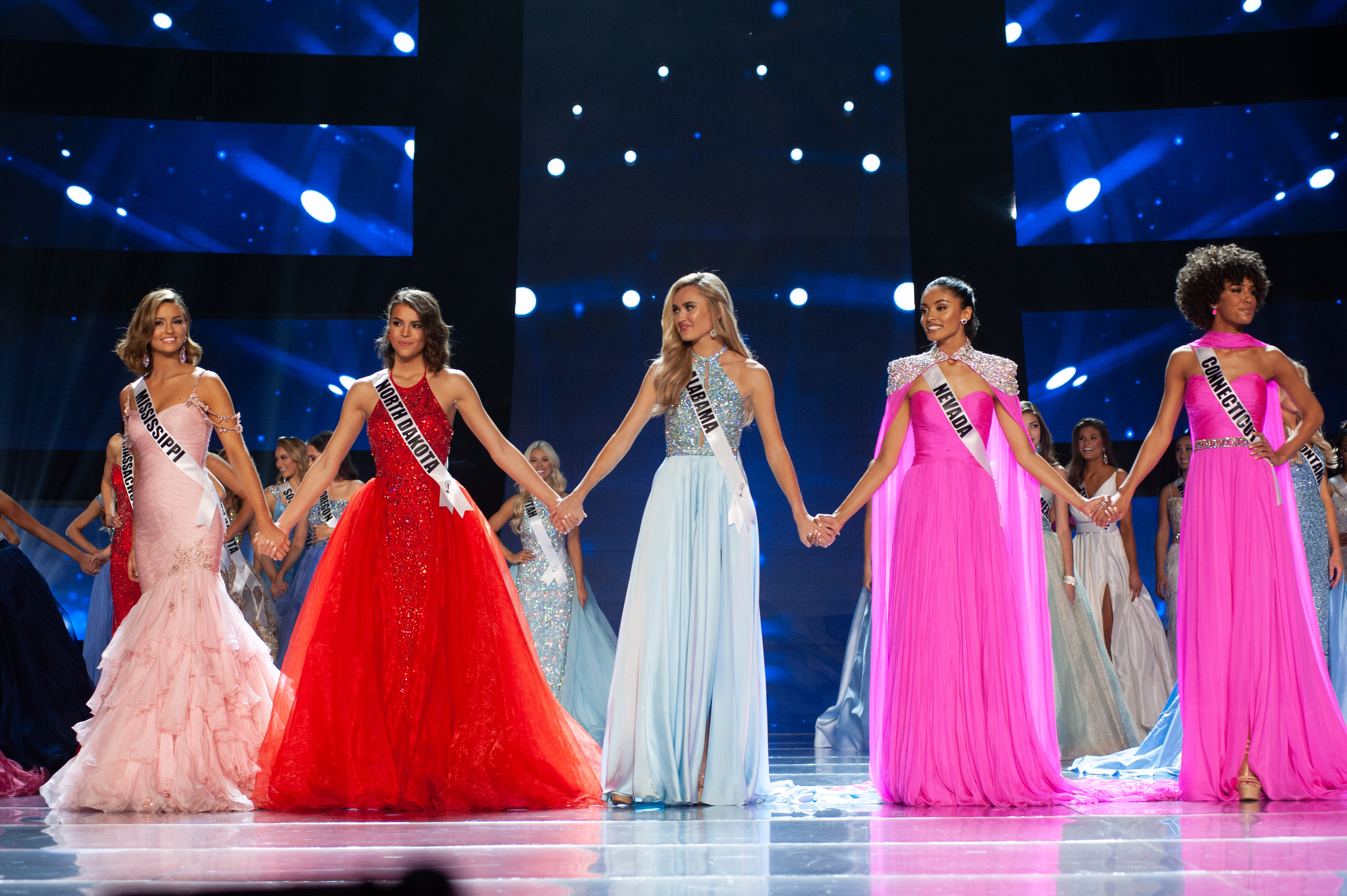
Miss Teen USA 2019 Top 5. Photo: Patrick Prather/Miss Universe Organization
A
A/B Stones: Rhinestones that are considered to be "fancier" than plain rhinestones because they refract a rainbow color-changing shine when under light. Many times these stones can be found on gowns and jewelry, especially pageant earrings.
Ad Page: Many pageants require or encourage contestants to buy or sell ad pages that appear in the pageant’s physical or digital program book. These ad pages typically feature a professional photo of the contestant along with “thank you” messages to donors and/or information about the contestant’s platform, community service, relevant organizations or personality. Often, judges are presented with a copy of these program books and can peruse them during breaks or review them to remember certain contestants.
Aged Out: When a contestant exceeds the maximum age limit for a specific pageant or age division, making them ineligible to compete.
Appearance: An event or service opportunity that a titleholder is asked to or required to attend. Many titleholders are required to make a certain number of appearances throughout their reign.
Appointed Title: A title given to a contestant to represent an area or state during the national competition. Appointed titles are typically given when there aren’t enough contestants to hold a physical pageant and directors will often go through a screening process to choose their appointed titleholder. These are most often seen in pageants with no state pageants or international competitions without a large following in any one country.
At-Large Contestant: A contestant who did not compete at a preliminary pageant competition but will compete for the national title. Sometimes comes with an appointed state or local title acquired by paying a set entry fee. See also: “state appointed” or "appointed title."
B
Boob Glue: Similar to butt glue, boob glue is an adhesive that is used to secure swimsuits or other tops to a contestant during a pageant. This helps prevent any fashion mishaps onstage.
Brand: Your brand is how you chose to use you talents, pageant and personality to best connect with your audience and especially the judges. It is important to start developing your brand before the pageant and use social media as a tool to reach a larger group of people.
Butt Glue: A sticky body adhesive that is applied to your bottom in order to keep your swimsuit from shifting while walking on stage. It can also be used to hold up evening gowns if a stronger adhesive is used.
C
Coach: A pageant expert that helps a contestant through every phase of competition by providing advice, pageant history and direct instruction.
Congeniality: Associated with the Miss Congeniality award, where one contestant is selected by their pageant sisters/brothers as the person who was the most approachable, fun, outgoing contestant. It can be considered one highest and most valuable awards to win.
Court: The runners-up, usually the top 5. Also refered to as "Queen's Court."
Crown Case: A case that titleholders typically carry their crown and sash in. These cases are usually made out of a sturdy, clear acrylic material in order to protect the crown and allow it to be seen. Some pageants include crown cases as a part of their prize package.
Crown Chaser: A crown chaser is a term that can have several different meanings;
The first definition of a crown chaser is of a pageant contestant who repeatedly enters pageants just for the opportunity to win a crown and add that crown to the collection that they have already won or earned. They generally do not truly care about or invest anything in the pageant systems that they compete in and they continually compete for crowns that have little to no purpose in their life.
Another definition of crown chaser is of a titleholder who decides to compete for another title while she is already holding a title. These are contestants that go from pageant to pageant just for the sake of competing. Some pageants, like charity or fundraiser pageants, do not expect any commitment from their winners beyond the day of competition, but many pageants have a non-compete clause attached to their titles, and competing for another title while already holding one, can have serious consequences.
Chicken Cutlet: The sticky, silicone adhesive to put in your bra or wear by itself. They can range in sizes from nipple covers, i.e. pasties, to bigger ones which serve as a push-up bra. Enhances bust area to create fuller, clean look without showing too much.
Cuchini: A “Cuchini” is a product that is worn by pageant contestants during their swimsuit competitions. It is an invisible and reusable pad that adheres to your bikini bottom with double-sided fashion tape to instantly eliminate the problem of annoying frontal wedgies, otherwise known as “camel toe.”
Cupcake Dress: A short A-line glitz pageant dress for a child that ends several inches above the knee and poofs out dramatically with many layers of material. These dresses are embellished with stones, sequins, rhinestones and beading.
E
Evening Gown: A portion of competition, usually described as elegant and classy. As a rule a evening gown has to have at least one part of the dress touch the floor while walking. A evening gown can be a high-low designs, however most pageants ask you to keep the high-low “classy” if choosing such gown style. Evening gowns may be embellished with beads, sequins, pearls or rhinestones. The cost of the gown is not taken into consideration.
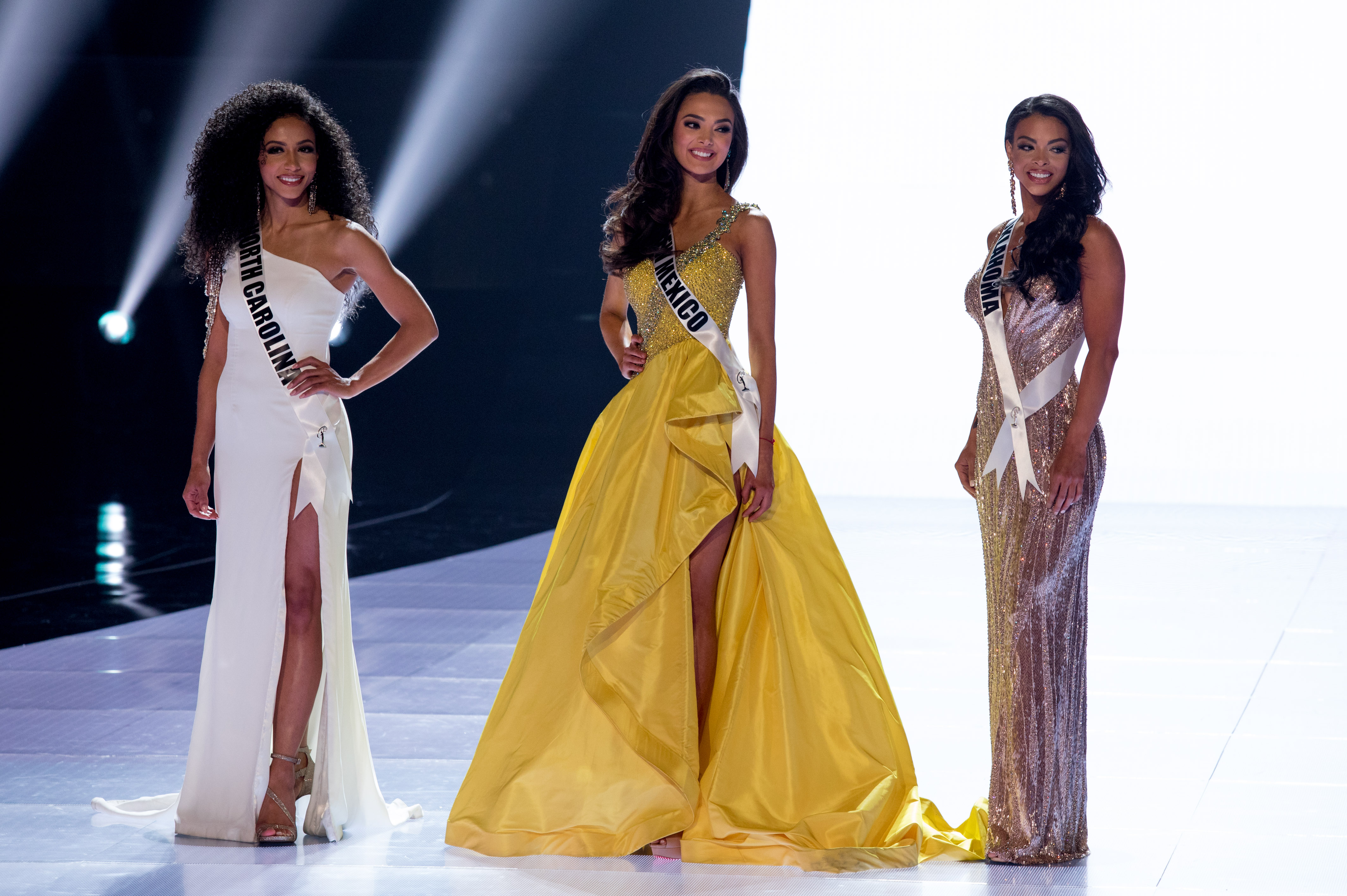
Miss USA 2019 Top 3. Photo: Alex Mertz/Miss Universe Organization
Extensions: In regards to hair; adding real or synthetic hair to either 1) increase length 2) add volume or 3) to serve as protection to your natural hair (i.e. sew-ins, or wigs). Eyelash extensions are also becoming increasingly more popular for every phase of competition.
Eyelash Extensions: Extensions for eyelashes that can be glued on or attached by magnets. These can last for multiple wears. Sometimes, eyelash extensions are also attached at a hair salon using an elaborate process. These last for a few weeks and can be maintained by monthly appointments.
F
False Lashes/Falsies: Fake eyelashes that are attached to your eyelid by glue or magnets to enhance your lashes and make your eye appear bigger. These can be "strip lashes," or many fibers attached to one strip. They can also be "individual lashes," or a few fibers attached together.
Farewell: Most pageants allow their outgoing queens to either give a speech or record a speech to be played during the finale to give them one last chance to shine and thank his/her family, friends and sponsors before passing on the crown.
Fashion Tape: Double-sided adhesive tape used to secure the edges of a strapless dress or top to the cleavage, side of the breasts or on shoulders to secure bra straps from slipping. This keeps an item of clothing in place and avoids a wardrobe malfunction. Fashion tape goes by many names including lingerie tape, cleavage tape and dress tape.
Final Ballot: Made famous by the Miss America Organization, the final ballot is used to determine the winner of the pageant. After all areas of competition have been completed to determine to Top 5, the scores are thrown out. Judges then re-rank the Top 5, choosing the winner and runner-ups. The final ballot was abandoned by the Miss America Organization in 2016. However, the final ballot was brought back to determine the winner of Miss America 2019.
Final Question: The final portion of competition, when the top contestants (usually the Top 3 or Top 5) are given a questionto answer onstage. Often, the questions are asked by the judges and are political questions. Unfortunate answers to these questions have made some contestants YouTube sensations. A pageant can be won or lost in this round.
Flipper: Pageant flippers are false teeth, normally worn on stage. The purpose of a flipper is to hide any imperfections of contestants' teeth, so that the smile presented to the judges is not crooked or containing any gaps.
Former: A titleholder who has reigned in a previous year; Someone who has given up her crown to another titleholder after her year of service.
The Four Points of the Crown: The phrase, “The Four Points of the Crown” refers to the core values of the Miss America Organization, which are based on the actual four-pointed crown that has been used in Miss America pageants since the 1950s.The four points of the Miss America crown represent style, service, scholarship and success.
Fun Fashion/Fashion Wear: A portion of competition, usually described as a fun, fashionable outfit that shows your personal style. Usually a high low, pantsuit or cocktail dress. Full length dress usually not allowed however, some exceptions may apply.
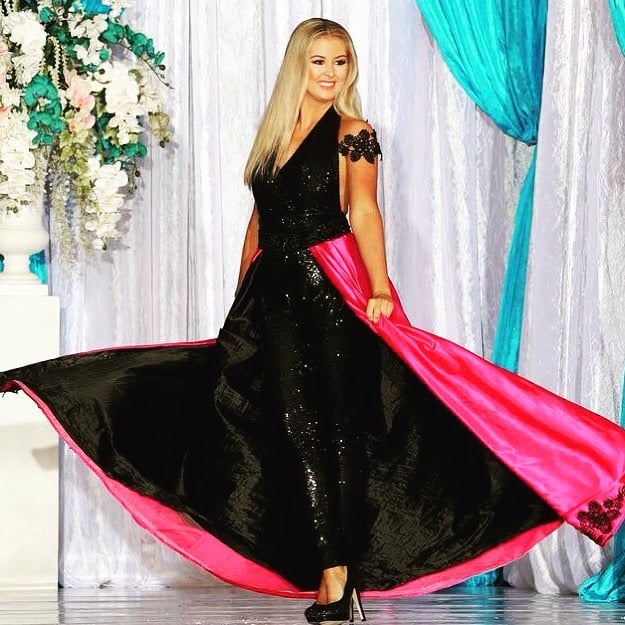
USA Ambassdor Miss 2018 competing in Fun Fashion. Photo: Bill Krautler Photography
G
Glitz: A Glitz pageant focuses on glamour and beauty. Usually for children, glitz pageant contestants must have perfect hair and makeup, perfect attire and perfect modeling routines. Most glitz pageants are looking the most polished individual. Big hair and big personalities are expected. These pageants have been featured on reality television shows like, "Toddlers and Tiaras."
H
HMU: Hair/makeup - Sometimes seen as MUA, which stands for makeup artist. Hair and makeup artists can be hired to do your hair and makeup for your pageant.
Hair extensions: Fake or human hair added to a contestant’s natural hair to give length and/or volume. Hair extensions can be sewn or clipped in. Halo hair extensions are a common extension type that is placed on the crown on the head and one’s own hair is pulled through to cover the extensions.
Headshot: A professional, studio-style portrait of only your head and shoulders. These are typically used for the pageant program book, the pageant website, People’s Choice voting and sometimes attached to your paperwork for the judges.
Learn how to take a winning pageant headshot in Everything You Need to Know About Pageant Headshots!
L
Leg Makeup: Also known as body makeup - a spray-on or rub-on body makeup that minimizes the appearance of spider veins, adds color and can have a bronzing effect to the skin. These products wash off with soap and water.
Local Titleholder: A pageant title that represents a city or area and qualifies a contestant for a state pageant. For a newer system that has not established a state pageant, these titles could also qualify a contestant for a national pageant.
M
Mock Interview: A mock interview is a practice interview usually conducted by industry professionals to help prepare you for the real thing. At least two to three months before your pageant, you should start practicing for pageant interview using mock interviews. During mock interviews, you simulate the conditions you will be under during the real interview. The purpose of mock interviews is to practice the pressure you will feel during the interview so when the big day rolls around you feel relaxed and prepared.
N
National Costume: A phase of competition that is sometimes held during international pageants. During this competition, contestants typically wear elaborate costumes that represents something unique about the country they represent.
Natural: A pageant that focuses on natural beauty, talent, interview and community service. Makeup is minimal for younger contestants (if allowed at all) and age appropriate for older contestants. Gowns usually have minimal stoning.
Natural Hair: Wearing your hair in it’s natural, often curly, afro-like state. No flat irons, sew-ins or wigs added.
Learn more about pageant hair in The ULTIMATE Guide to Pageant Hair!
O
On-Stage Question: A phase of competition that is usually reserved for pageant finals. Contestants in the finals are each asked a question live, onstage and generally have a certain time frame in which to answer it. In most cases, the contestants do not know their question ahead of time and are forced to think on their feet.
OOAK: “One of a kind” refers to a piece of pageant wardrobe that is custom-made and is the only one of its kind.
OOC: Outfit of choice. Literally means, any outfit of your choosing. Focus on something that makes you feel great and showcases your true personality. Create an age-appropriate routing suitable for and specific to the outfit.
Open Pageant: A pageant held where the contestants do not have to live in a designated mile radius or geographical location in order to be eligible to compete, and the contestants may be competing for more than one title during the same pageant. Open pageants are common in the Miss America Organization for local titles. For example, an eligible contestant may compete for Miss Apple Valley (an open pageant within the state of Washington for the MAO) and live, work or go to school anywhere in the entire state of Washington to be eligible.
Opening/Production Number: A dance, presentation of national/state costumes and/or the introduction of a contestant by name, number and/or preliminary title. The production number is not judged as a rule and simply a fun introduction to the pageant show itself!
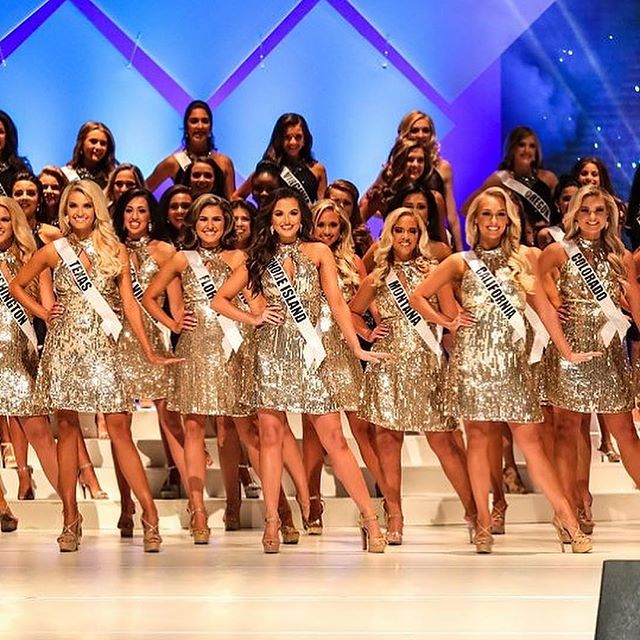
Miss Collegiate America 2018 Opening Number. Photo: Miss High School America Pageant
Optionals: Optionals are additional competitions that can be entered during a pageant. Optional scores do not count toward the overall beauty title, but are another way to win either crowns, trophies or cash. They are never mandatory.
OTR: Off the rack. These are outfits that are purchased at the store, straight off the rack without the addition of embellishments. If a competition calls for an OTR outfit, don’t show up in something custom.
Overskirt: An overskirt is a type of skirt that can be part of an evening gown or fun fashion outfit. This skirt can be attached or detachable and is placed over pants, shorts or a gown. For example, Sarah Rose Summers’ winning gown at Miss USA 2018 had an overskirt.
P
Pageant mom: Often a derogatory statement made about mothers of contestants who are seemingly controlling or overly invested in their children’s placements.
Pageant Patty: A pageant patty is a pageant contestant who, generally speaking, is lacking in emotional depth, does not have a strong sense of self and is terrified of making mistakes. Because she has so much fear and lacks individuality, for whatever reason, she is prone to putting on a mask or a character and then tries very hard to be what she perceives is the perfect pageant girl. She cannot seem to think for herself, so she attempts to tell everyone what she thinks they want to hear. As a result, she is robotic in her mannerisms and recites canned, unimaginative answers during the interview process. She can be flat and boring on stage while wearing a fake, pasted on smile, and she will often come across as being insincere, inauthentic and generally shallow.
Panel Interview: This is one of the most common styles of interviews for Miss, Ms., and Mrs. contestants. The contestant is either seated in a chair or standing at a podium in front of the judges. The judges will be seated at a long table directly in front of the contestant. Either one judge will handle the duties of asking all of the questions for the judges or each judge will ask their own question.
Paperwork: Paperwork, although time consuming, is one of the most important parts of your pageant preparation. The judges receive contestant paperwork prior to meeting them, so this is truly your opportunity for a first impression. The paperwork packet usually includes the titleholder contract, resume, platform statement or community service essay, but this depends on the system.
People’s Choice Contest: Usually done in the weeks leading up to pageant finals, this is a game in which each contestant’s headshot is uploaded to a formal voting platform. Contestants promote themselves to their family and friends who can vote for them either through photo “likes” or more commonly through purchasing a certain number of votes. Contestant with the most votes at the end of the game is the People’s Choice Winner and typically is given an automatic spot in the finals. Some pageants offer a portion of proceeds raised as a scholarship as well.
Personal Introduction: This is usually done directly after the Opening Number Production. Each contestant introduces themselves to the audience and typically states where they are from, the name of their title, and sometimes a fun fact or what school they attend/what grade they are in. This is typically not a judged portion of competition although it is often the judges first opportunity to see you after interviews.
Photogenic: Photogenic is the best overall photo winner. Sometimes seen as a Optional competition, and sometimes mandatory. Mostly judged on personality, beauty, grooming, fashion sense and confidence.
Platform: A platform is a cause, issue or topic you choose to promote during your time as a titleholder. Most pageant systems require each contestant to select a platform prior to the pageant, write an essay about their platform and are asked questions about their platform during the interview and on-stage question portions of the competition. It is important to know your platform well and be passionate about this issue, so during your reign you can serve it passionately.
Prelim: is short for preliminary competition. Some pageants (especially larger systems) use prelims to determine the smaller group of participants into the top 15, 10, 5, 3 ect. Prelims usually are about a weekend long but can be longer than 2-3 days. For much larger systems there may be a Preliminary Pageant to determine which contestants go on to participate at a state, national and/or international level.
Pretty Feet: Place your right foot in front of the left, pointing the toe towards 1 o’clock. The arch of your left foot should almost touch the right foot’s back heel. Left toes should point at approximately 10 o’clock. Don’t lock your knees - have a slight bend. You can also switch to have left foot in front; simply repeat the same steps.
Princesses: Young girls who escort contestants in the evening gown portion of competition. This is especially common in the Miss America system, where many states have mentorship program between the contestants and young girls. The princesses often get to also perform in an opening number and attend special princess events. Some go on to compete when they are old enough.
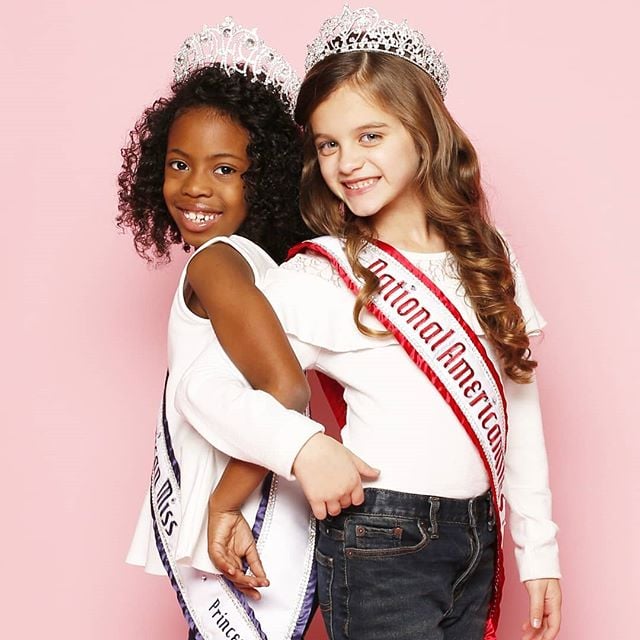
National American Miss Princesses 2018-2019. Photo: Brittany Link Photography
Program Book: The book, booklet or magazine style program book is usually given out to the audience the day of a pageant, and can sometimes be a souvenir program book that costs money to purchase. Within the book are usually the contestant headshots, short biographies, stats and talent information, as well as letters from the directors of the organization, farewell messages from the outgoing queen(s), scoring information, and advertisements/sponsor images.
Need to pay your program book fee? Learn about Pageant Planet's Contestant Fundraising Feature!
Q
Queen(s): This refers to the reigning titleholder in your pageant system.
R
Regional Titleholder: A regional titleholder is much like a state titleholder but instead of holding a “Miss (State)” title, she holds a “Miss (Region)” title. For example, Miss Mid-Atlantic is a regional title. Regional titles are either appointed titles or are awarded based on competition at a pageant.
Reign: A reign is the period of time that a titleholder is the current queen.
Resume: Paperwork detailing your achievements, positions held, and community service.
Round Robin Interview: This is the style of pageant interview where the contestant speaks with judges one-on-one, usually seated at a table. The title, “Round Robin” refers to the fact that each contestant will go from judge to judge until they have completed the entire circuit. Each judge will have a copy of the contestant’s paperwork and they will ask the contestant any questions that they like.
Need to know more about pageant interview? Check out How to Succeed in Pageant Interview!
Runner-up: The contestant who comes directly behind the winner in points scored; The person designated to take over if a titleholder is unable to fulfill her duties.
Runway: An aisle that extends into the audience, allowing contestants to walk down and often strike a pose in closer to proximity to the judges.
S
Sarong: An accessory that can be worn during the swimsuit competition at a pageant. Sarongs are typically a single piece of light fabric, similar to a scarf, that can be wrapped around a contestant’s hips or waist.
Service: The titleholders is expected to give back to the community. This type of service is often seen through the form of volunteerism or partnering with a company, organization, or community to bring awareness to a problem the titleholder is passionate about.
“Show Me Your Shoes”: A traditional parade in Atlantic City, New Jersey for the Miss America pageant. Contestants will dress in a costume representing their state, with the shoes as the highlight.
Sister Queens: a sister queen can refer to all of the fellow state/regional queens competing for the same title. For example, Miss Pennsylvania and Miss Maryland are sister queens. A sister queen can also refer to the winners of other age divisions in the same state. For example, a Miss Pennsylvania Princess and a Miss Pennsylvania in the same pageant system are sister queens.
Sponsor: A sponsor is an individual, business or organization that donates services, items or funding to a contestant or a pageant. Some pageants will have a required “sponsorship fee” to compete, which requires contestants to either raise money to compete or pay the fee themselves.
Need to pay your sponsorship fee? Check out Pageant Planet's Sponsorship Program!
Spray tan: A beauty treatment where the body is sprayed with a dark liquid to ensure a darker skin tone for the contestants. Some spray tan specialists can add darker lines to the body to make the appearance of abs or other definition lines.
Sticky boob: See also chicken cutlet. An adhesive bra (can be two individual portions that clip together in the middle, or one bra unit) that can be worn alone or under a regular bra to help with lift and definition under garments that are backless or have a plunging neckline.
Supreme Titles: Supreme titles are often awarded at glitz or semi-glitz pageants. Contestants who enter the main pageant as well as a certain number of optionals are eligible for the supreme titles. Those titles (grand supreme, mini grand supreme, etc.) come with a bigger crowns and are more prestigious.
Sweeper Pageant: Similar to an open pageant, where contestants may live anywhere within that state in order to compete for a local title, but there are stricter eligibility rules. To be eligible for a sweeper pageant, a contestant must have been NAMED an on-stage runner up within the last pageant-calendar year, OR the contestant must have been a titleholder within the last pageant-calendar year.
Swimsuit: A portion of competition that judges on a contestant’s fitness and confidence. Competition swimsuits are typically two pieces, but can be one pieces depending on the system.
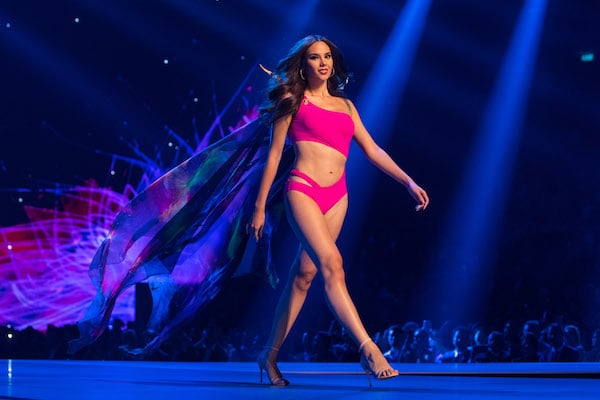
Miss Universe 2018 Catriona Gray competing in swimsuit. Photo: Miss Universe Organization
System: Each pageant system is a privately owned business that is comprised of its own set of rules, areas of competition, scoring criteria, and overall vision.
T
Talent: A portion of competition where the contestants demonstrate a talent that they have worked on. Common talents seen during competition include singing, dancing and piano.
Learn more about this competition in Pageant Talent: The Complete Guide!
T-Stance: The foundation of all pageant poses and walking patterns. It references a specific placement of a contestant’s feet which resembles the letter T. Other major factors in a proper T-Stance include erect posture and relaxed shoulders.
Theme Wear: This part of a pageant requires a contestant to wear and model an outfit that has to do with an overall theme, typically for a holiday or cause. Examples can include Christmas wear, Halloween wear or Breast Cancer Awareness.
Titleholder of the Day: A feature available through Pageant Planet in which a contestant makes a short video to introduce themselves, their pageant system, their platform, and a fun fact or their best advice. This feature is posted to Pageant Planet’s Facebook, Instagram and appears on the Pageant Planet Daily Newsletter as well. Contestants, Parents, and Directors can submit individuals for this feature.
Titleholder Plan: A necessity for contestants to develop their strategy as an existing or potential titleholder. This plan consists of any combination of the following factors: marketing, social media, pageant recruitment, community service, public speaking, and other appearances. A titleholder plan can potentially position a contestant more competitively as it is a more individualistic approach that sets them apart from other contestants.
Tippy Top: An extremely popular open toed pageant shoe created by the brand, Chinese Laundry. The actual name of this shoe is the “Teaser platform sandal” but they are commonly called “Tippy Tops” due to the fact that they have a 5 ½ inch high heel and a 1 ½ inch platform. Chinese Laundry has sponsored and supplied this shoe to the Miss Universe pageant since 2012. Tippy Tops were initially worn during the swimwear competition, but have become so popular that they are now worn by contestants in all systems, and of all ages in all phases of pageantry. Because of the nude patent material that the shoe is made from, these shoes elongate the legs, making the wearer look taller, longer and leaner.
The shoe designer, Marc Defang has created his own version of the Tippy Top, and his shoes are nearly the same as the Chinese Laundry original, with a few notable differences. The Defang line comes in a variety of colors, including several different “nude” shades so that women with a variety of skin tones can find a comparable match. His shoes also have a quick release clasp, whereas the original actually has a real buckle. The Defang clasp makes changing the shoe during a pageant very quick and convenient. These are called "Marc Tops."
X
“X's:” X’s are commonly put on the stage by directors to mark the walking patterns. X’s are placed where each contestant should stop to pose. They are used to keep the patterns consistent.
Are we missing a term? Let us know by filling out this form!
First Time Pageant Help
So now that you understand the language of the industry, it's time to move forward with your pageant preparation.
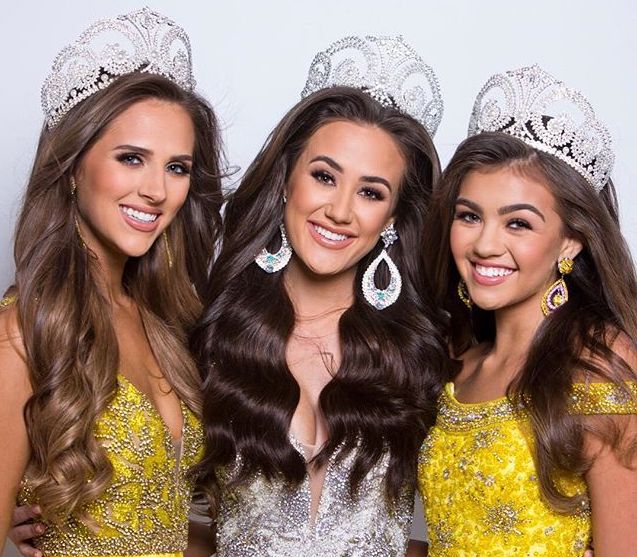
International Junior Miss 2018 Queens. Photo: Kathy Whittaker Photography
First, you need a pageant to compete in. Have you selected a pageant? If not, check out our pageant database to find the perfect pageant for you. If you have already selected a pageant, it's time to find a pageant coach to guide you on your journey. Visit our pageant coach database or check out the Pageant Planet Membership option to get started.
Next, do some reading about the competitions in your pageant and everything you'll need to know leading up to pageant weekend. We recommend starting with 101 Tips for First Time Pageant Girls! After that, check out our other courses:
Pageant Talent: The Complete Guide
Everything You Need to Know About Pageant Headshots
A Queen's Guide to Pageant Makeup
The ULTIMATE Guide to Pageant Hair
The ULTIMATE Guide to Pageant Shoes
Pageant Dresses: How to Style, Pose and Walk
How to Succeed in Pageant Interview
Finally, find your wardrobe and get ready to practice! We believe in you. Now, go get that crown!










Wedding Time Bridal [email protected]
Thanks for sharing this wonderful post, loved the dresses
July 03, 2019